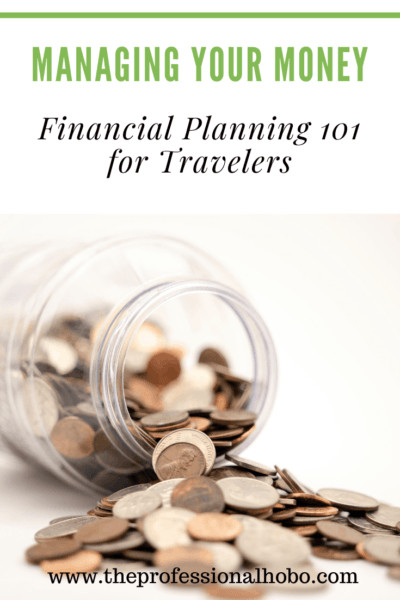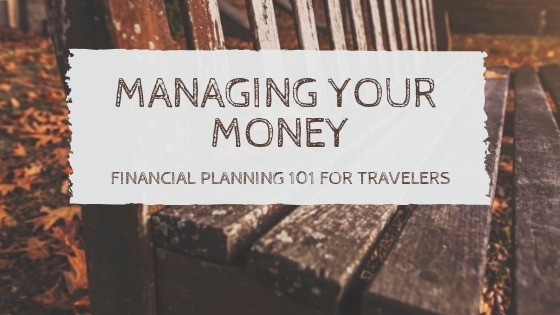Being a long-term or full-time traveler throws a whole new set of complications into the already daunting task of how to manage your money.
In this guide, I cover the basics of financial planning and money management for travelers, all the way from setting a budget, saving money, and dealing with your assets like real estate before you leave, to managing your money while you’re on the road, to advanced topics like retirement planning, debt management, and investment techniques.

Table of Contents
Chapter 1: How to Assess Your Financial Situation Before You Leave and Determine Your Travel Budget
Chapter 2: How to Organize and Manage Your Finances While Traveling
Chapter 3: How to Handle Debt When You Want to Travel
Chapter 4: How to Save for Retirement While Traveling
Chapter 5: Your Money and Others: Things to Consider When Others Are Involved
Chapter 1: How to Assess Your Financial Situation Before You Leave and Determine Your Travel Budget
If you don’t have a good grasp of your financial situation before you depart for your travels, it’s likely to unravel on you when you’re on the road. Take it from me, I’ve seen it happen – and you don’t want that.
In this chapter we talk about how to determine your travel budget, tips to keep expenses low if you’re on a strict budget, and how to decide what to do with your house while you’re abroad.
How Much Money Do You Need to Travel the World?
Here we go; the million dollar question (for which hopefully the answer isn’t “a million dollars”): How much money do you need to start traveling?
If I could give you a number, I would.
Unfortunately, it’s not that easy.
Instead, here are some questions to ask yourself that will help you define your travels, set a travel budget, and figure out how much to start with:
Define Your Trip
- How long will my trip be?
- Where am I going? (Pay attention to the cost of living/traveling through those countries. Websites like Budget Your Trip can help you estimate these expenses.)
- Where am I starting? (People who live in Australia and New Zealand, for example, need to pay a lot to go abroad due to their relative isolation, but can also get great deals on Round-The-World (RTW) tickets, which are usually least expensive when starting there.)
- What do I want to do? (Volunteering can reduce your expenses; skydiving won’t.)
- Why am I going? Are you expecting all-inclusive vacations in Europe, or rustic home-stays, or are you on a mission to conquer mountains, or do you want to hit the backpacker trail?)
Assess Your Income
- Do I have a business to provide an income along the way? (If so, what do you need – financially and logistically – to operate this business?) See also The Beginner’s Guide to Going Location Independent.
- Am I eligible for a Working Holiday Visa?
- How long will it take me to find a job? (This depends on your skills and how in-demand they are where you’re going, and whether or not you can work legally.)
- Is my trip short enough that I can do it on savings alone? (If your trip is under six months, worrying about getting work along the way will infringe on your travel experience. If you can, do it on savings and “save” yourself the hassle.)
Remember Insurance & Emergencies
- How much is travel insurance coverage?
- For my emergency fund, how much do I need to get home in a pinch?
Define Your Ideal Travels Before You Leave
My partner who I started traveling with wasn’t in a stellar financial situation. We left before he reached his savings goal (and with some lingering debts to boot), on the premise that he could find work along the way. Although he was periodically able to do so, finding jobs was tougher than anticipated.
Despite my financial planning background, we had trouble predicting what our travels would cost (in 2006 there weren’t nearly the online tools available that there are today), and thus how much money we needed to hit the road. So we threw our hands up and just took the leap of faith we knew we had to, and figured we’d learn how to swim once we were in the water.
Which we did. But the water ran deep, and it made for some trying times.
It takes time to define your ideal travels and put a general price tag to it. But it’s 100% worthwhile, and can also be a fun exercise in dreaming about what you want to do and where.
Things may change along the way, but as long as you have the money – or the ongoing income – to keep up with Plan A, then Plan B can be tweaked accordingly.
NEXT UP: Once you have established your travel budget, you may need to reduce your expenses to save money! Check out these creative strategies for reducing your fixed expenses and save up to $4,000/year extra.
Tips to Stay Within a Strict Travel Budget
A reader once wrote me with the following question:
I read an article you wrote about being able to travel for 1 year for $17,000.
My idea is to do long-term work exchange, maximum 2-3 different places, possibly not too far from each other and only the ones which offer accommodation and food. My goal is to spend no more than $6,000/year. Is this totally unrealistic?
This is a great question. You could probably keep your travel budget that low, providing you do a few things:
1) Don’t travel internationally (stay on your continent). The farther you go, the more you’ll pay to get there (and back). A return flight from North America to Asia or Australasia is $1,000 – $1,500 – that’s up to 25% of your annual budget right there.
2) Volunteer at places that provide both accommodation and meals. These tend to be out-of-the-way locations, often quite rural, so you don’t really have a chance to spend money on anything other than food and accommodation – which is covered. (In my experience if I’m in a city, I spend more money). See also: How to Get Free Accommodation Around the World.
3) Travel slooooooooowly. A minimum of 2-3 months in each destination is good, and like you say, if they’re pretty close to together you’ll save further travel expenses. See also: The #1 Reason Why I Love Slow Travel.
If you are volunteering in exchange for food/accommodation, your only expenses will be toiletries and personal effects, extras like drinks or trips into town (depending on where you are), and – this one’s a biggie – the travel expenses you incur between volunteer gigs. This is where you’ll rack up accommodation, food, and transportation expenses that can easily get out of hand, especially if you are coming out of 2-3 months of rural life and are suddenly in a city trying to recoup, restock, and rejig.
My cost of full-time travel is certainly not the same as other people’s costs, and this reader was not the first person to ask me if it can be done for under $10,000. It’s a matter of personal priorities, travel goals, and lifestyle choices. (Read: Financially Sustainable Travel: How to Create Your Own Long-Term Travel Budget)
Check out the down-and-dirty details of my exact cost of full-time travel in my annual expense and income reports!

What to Do With Your House While You Travel
If you rent your current place of accommodation, your decision will be whether to sublet, leave it empty, or move out. Criteria for this decision may include how long you’re traveling for, whether there’s a penalty for breaking your lease, and whether your lease permits subletting. (Most leases expressly forbid using services like AirBnB).
If you own your house, it’s a wee bit more involved, but the options are similar: rent it out while you travel, or sell it before you leave.
To help you decide which option is best for you here are some things to consider:
Renting Your House Out While You Travel
There’s a lot to think about when renting your house out while you travel.
You’ll need to either hire a property management company or get friends/family to manage the tenants for you. (For example: if tenants leave or there are repairs, you don’t want to be getting overseas phone calls – you need somebody on the ground to take care of these things as they arise, and to search for new tenants if needs be).
You also need to be comfortable with someone else living in your home while you’re abroad – for some people, this is too stressful.
If you can see your way to doing it though, it’s a very wise strategy, since you will have an appreciating asset to come home to; one that has also been generating a passive income for you while you travel.
Speaking of passive income, if the house is fully paid off, the rent money can be used to cover off property taxes and other home-ownership expenses, and the rest can pad your travels.
If you still owe money on your mortgage, then the rent money can be used to continue to pay it off, no sweat.
Selling Your House Before You Travel
Selling your house can have just as many things to consider before you pull the trigger.
For example, what is the current real estate market doing in your neighbourhood and surroundings?
If you can sell the house for a gain over what you bought it at, it may be worthwhile to do so and solidify your gains. (Don’t forget to factor in the tax consequences – if any – of doing so, depending on where you live). Yes, you will miss out on any future gains in value by selling, but if you know your market you’ll know whether the projected gains will be worthwhile for you.
Here are some other reasons to consider selling your property:
- You were planning on downsizing anyway
- You can’t afford to pay the mortgage while you’re away (even with rental income, or if you’re unwilling/unable to rent)
- You don’t want to be concerned about it while you’re abroad
- You need the money for something else (consider where you’ll live later on, and how you’ll afford it if you spend the property sale proceeds)
- It’s a market timing opportunity (be careful of timing markets; even if you lock in inflated gains with the sale, nothing is guaranteed – including where the market is headed)
- You want to relocate, but don’t know where to yet
If you sell the house, you also need to think about how much money you want available for when you return. You may want to buy another house (and furnish it, along with all the other costs that can come with buying a house).
If this is the case, beware of spending too much (if any) of the house proceeds on your travels. Stash away the amount you want to keep for your return in a separate account or investment so you won’t be tempted to spend it on impulse abroad. (More on investment choices and vehicles in Chapter 2)
I personally chose to sell the lot to keep my options open on the road, and I’m happy I did it this way, since my travels are open-ended.
But it all boils down to you, where you live, how long you plan to be away, and what “security” means to you.
And don’t forget: if you are traveling for a fixed time period and you want your home (and perhaps even pets) to be well-loved in your absence, you can consider getting house-sitters or doing a home exchange.
Chapter 2: How to Organize & Manage Your Finances While Traveling
Financial planning and managing your finances is about more than just your budget and how you carry/access/spend your money (which I cover in detail in my Ultimate Guide to Traveling With Money). It’s also important to consider the bigger picture and how your money is being saved and invested while you travel.
In this chapter, we talk about all the different accounts you might need to organize and grow your finances while you travel, as well as how to keep an eye on them in the day-to-day and in the longer term.
Choosing The Right Bank For You
In my Ultimate Guide to Traveling With Money, I discuss using ATMs, debit cards, and credit cards on the road.
But what about banking on the road? For example, what banking institution do you start with?
Vague Answer: It depends on where you’re from.
While I’m hesitant to recommend specific institutions since your country of origin has a lot to do with what’s available, here are some criteria for choosing a bank account that will serve you well while you travel:
The more branches they have around the world, the better.
Generally if you use an ATM associated with your home bank, the withdrawal fees will be minimal if anything, and the scope of services will be more comprehensive. HSBC tends to be a favourite among travelers for this reason, with more ATMs around the world than most – if not all – other banks.
However, don’t expect the bank abroad to be able to manage all the things you might do at a bank at home; just because it has the same name doesn’t mean it’s 100% connected.
Keep monthly fees low.
When choosing the specific bank account within any institution, you obviously don’t want to pay an exorbitant monthly fee. (In fact, paying nothing is even better).
Some bank accounts waive the fees if you maintain a certain minimum balance; but make sure the minimum balance in question isn’t too high, since your financial risk is higher if your debit card is stolen and your account cleaned out. To minimize the risk of having your account cleaned out, you can also set maximum daily and weekly withdrawal limits for your account.
Then again, sometimes paying a small monthly fee and getting a certain number of transactions for free is worthwhile. This will depend on your personal banking style; how many ATM withdrawals or debit transactions you expect to make, whether or not you write cheques, etc.
Go paperless, and sign up for online banking.
Managing banking online is essential for travelers, and there’s no point in paper statements coming to an address you’re not occupying.
What I do:
I’ve stuck with the same bank since childhood, and regardless of whether it’s the best bank to use for travel, it serves me pretty well.
I have the “all-inclusive” account service option, which gives me unlimited free foreign ATM withdrawals and other perks. I save on the $30/monthly fee by maintaining a minimum balance of $5,000 (which may seem like a lot, but saving $30/month is worth it, and the $5,000 minimum balance serves as my emergency fund).
And I am able to do all my banking online, which is a must for getting paid and maintaining a location independent business.
But remember: whenever you access your bank accounts online, be sure to use a VPN.

Managing Your Online Savings Accounts While Traveling
Generally speaking, your travel savings (in both accumulation and redemption modes) should be invested very conservatively, since you’ll have a relatively short time frame to needing the money, and can’t afford to lose value in a market fluctuation.
Online high-interest savings accounts are ideal for this purpose.
They offer better yields than regular bank checking/savings accounts, they’re more secure (since debit card access is often restricted or impossible), and they are great vehicles for saving money to travel.
Here are some tips for using a high-interest savings account to save for travel, and accessing that money while you’re traveling.
Saving for Travel
Make it Automatic
While you’re in accumulation mode, set up an automatic transfer of money from your bank account to your travel savings account.
If you set it up to coincide with your paychecks, you’ll be effectively “paying yourself first”.
And if you’re really dedicated to saving for travel, you can take any surplus funds after your bills are paid and manually transfer that over to your travel savings account, too!
Accessing Savings While Traveling
Give it a Few Days
One of the things I like about keeping my travel savings tucked away in a separate high-interest online savings account is that I can’t access it instantly. So if I end up in a sticky situation and my ATM card is compromised, my financial liability is limited to the minimum balance I keep in my bank account (and my preset withdrawal limits).
But the flip side is when I need money from my travel savings account, it takes a few days for it to transfer through to my bank account.
Although I’ve never had any trouble with this, it does take a little forethought and preparation to ensure the funds are there when you need them.
If you anticipate needing a regular stream of income from your travel savings account, you can set up an automatic redemption plan, just as you did while accumulating.
Most banks have money market accounts, or some kind of high-interest savings account you can use. I like using Tangerine for my high-interest travel savings, and have had no complaints.
Special Deal for Professional Hobo Readers in Canada
Tangerine (formerly ING) wants to give you a bonus for opening your own savings account! When you open an account with a minimum $250 balance, they’ll give you up to a $50 bonus. It’s like an instantaneous 20% return on your money!
To take advantage of this offer, simply open an account with this link and enter the following “Orange Key” when prompted:
15312741S1
Note: This may or may not work for readers of different countries (I’m not sure, but it’s possibly only a Canadian/U.S. discount code). But for the bonus money, it’s worth a shot!
Other Tips for Managing Your Online Savings Account On The Road
Here are some tips for using and managing your online savings accounts effectively as a traveler:
Two-Factor Authentication
Having an extra layer of security during the login process is ideal. The harder it is for people to hack into your accounts, the better.
No Fees
Online savings accounts have pared-down services (since everything is online); thus the fees should be similarly pared-down. All you should need to do with your travel savings account is move funds to and fro between your bank account – which should never carry a fee.
Check With Your Bank
Your bank might offer a high-interest online savings account, which will make it even easier to transfer funds between accounts. (But again – check for fees!)
Set up Dedicated Accounts
I have an online savings account for my taxes, one for savings, and one as a “slush fund” where I invest extra earnings from my higher-income months (to use as needed during lower-income months).
Compartmentalizing each savings goal helps you track your progress better. More on this concept in the next section.
Watch Your Balance
If you have a lot of money in your online savings account (and you don’t have an immediate need for it all), consider moving some of it into a longer-term investment that will get you a better return. You don’t have to go crazy and risk it all (or any of it), but if you can afford to let it sit for a while, consider bonds (if you want a guarantee) or low-risk mutual funds. More on this below.
Don’t Forget to Use a VPN
I can’t emphasize this enough; a VPN is an absolute essential while you travel, especially when it comes to accessing websites with sensitive or private information. Here’s everything you need to know, along with my personal recommendations and tips for use.

Where to Invest Your Travel (and Other) Savings
Where do you invest your travel savings when you’re accumulating money for a big trip? How do you invest and draw down on it while you’re on the road? And what about other savings, like retirement, or the proceeds of the sale of your house?
Welcome to the wonderful world of asset allocation.
There is no template answer to these questions. Your personal asset allocation plan depends on your age, time frame, goals, income needs, and stomach for volatility. And depending on your goals (you can have multiple investment goals, independent of one another), you might have different asset allocation plans for different investments.
Here is my asset allocation plan:
Travel Savings: “Cash”
This is a high-interest guaranteed savings account that I draw on when needed, or add to if my income exceeds my expenses, as it often does.
Household Sale Proceeds: Moderate Conservative
I initially invested the proceeds from selling everything I owned in a Conservative account, so that I’d have the money available to me whenever I wanted to set up a place again.
But a few years into my full-time travels, I realized I wouldn’t likely be “settling down” any time soon, so I increased the risk profile of the account to Moderate Conservative to take advantage of some potentially higher growth.
Retirement Savings: Moderate Aggressive
All of my working life before I started traveling full-time, I saved a percentage of my pay for retirement. Although I joke that I “retired” at the age of 30 to pursue my full-time travel dreams, this money remains tucked away for a time when I’m unable (or unwilling) to work or earn an income. (More on this in Chapter 4)
I have some registered (called RRSPs in Canada) and non-registered money invested under the retirement umbrella, but since I anticipate my golden years are a few decades away yet, I’ve invested it moderate aggressively to take advantage of long-term average returns (despite short-term fluctuations).
If you’re not sure what constitutes various investment profiles like “moderate aggressive” or “moderate conservative”, check out my article Why Asset Allocation is Critical to Your Travel Plans for a comprehensive introduction to Asset Allocation, along with some profile examples so you can figure out where you fit into the mix.
Having an Emergency Fund While Traveling
Stuff happens while we’re on the road. I’ve been caught in the midst of natural disasters (three, to be exact), been in hospitals (too many for my liking), had laptops destroyed, and worn through travel gear that needed immediate replacement regardless of whether it was convenient or cost-effective at the time.
And though (knock on wood) it hasn’t happened to me, there are also times when – no matter where you are, or what you’re doing – you need to go home. Immediately.
Sometimes, you simply must dip into your wallet whether or not you want to.
Whether or not you can is not a question that comes into play. You have to.
For these instances, having an emergency fund will be useful.
How Much to Have
My rule of thumb for an emergency fund is to have the ability to get on a plane from anywhere in the world to home on a moment’s notice. If you have enough money to do that, you probably have enough money to cover off just about any emergency that comes your way.
How to Save/Invest It
Most of us don’t have a few thousand dollars kicking around “just in case”. If you do, great. Set it aside in a separate dedicated travel savings account reserved for emergencies, and you’re golden.
If you don’t have that sort of extra cash, an alternative is to carry a credit card with enough room to deal with emergencies, and never to spend beyond this emergency threshold. (If you carry a dedicated emergency credit card, make sure you still use it from time to time to avoid having it cancelled out from under you for non-use).
Hedging your Bets
There are ways you can hedge your bets and reduce possible emergency expenses (or at least be able to deal with them effectively). For example, travel insurance will ensure you aren’t saddled with unexpected medical bills. This has come in handy for me on more than one occasion.
It’s also a good idea to carry more than one credit or debit card, in case one is compromised and you need access to cash quickly.
Tracking Expenses While Traveling
Sticking to a budget while traveling is considerably more difficult than when you’re at home and have relatively fixed expenses. On the road, anything goes, and your spending can fluctuate wildly from day to day.
So, if you have a budget, the only way to know whether you’re on-target is to track your expenses.
I’ve been tracking my expenses for years. It’s the first thing you do if you’re establishing a budget (in any circumstances, not just travel), and the only way to analyze how you’re spending so you can make adjustments if necessary.
And while tracking expenses may seem like a drag, it doesn’t have to be. Enter: TravelSpend.
The Best Travel Budget App: TravelSpend

TravelSpend is available on iOS and Android. It’s quick, intuitive, and has easily customizable categories so you can organize and record your expenses in a way that makes sense to you. You can add expenses on the go (online or offline) and foreign currencies are automatically converted to your home currency. You can compare your actual spending with your travel budget as you go so you can stay on track.
And if you’re traveling with somebody, you can sync and share the budget and expenses with them, split costs, and more.
You can export the information to a spreadsheet for manipulation – a feature I treasure in compiling my annual cost of full-time travel posts.
An Android-only alternative to TravelSpend is called Hop Wallet.
Lastly, if you’re traveling as a group and sharing expenses, then Splittr or Splitwise is essential. I discuss it more in the section about managing finances as a couple, below. I’ve used both, and they’re great.
How to Conduct a Semi-Annual Financial Review
When I started traveling full-time, it was with a partner who was in a different financial situation to me. We managed our finances separately, but we each knew what the other had. While his savings were pretty small, he expected to get work along the way (which he did, but only to an extent).
We didn’t do semi-annual financial reviews. We totally should have – because it would have saved me from shock when my partner sheepishly admitted that he had run completely out of money….in Australia, on the other side of the world. It was not one of our finest moments.
Regardless of whether you travel solo or as a couple – performing a semi-annual financial review is a necessary exercise to ensure your travels are financially sustainable.
It may sound foreboding, but it doesn’t have to be. In organizing your finances for the road, as we’ve done so far, you already have a clear picture of your financial situation as well as some semblance of a travel budget and expense history.
With this information in hand, simply sit down (together, if you’re a couple) every six months and take stock.
Some questions to answer:
- How much income have you earned?
- Will your income change in the next six months?
- How much money have you spent?
- Have you dipped into your savings? If so, how much?
- If you continue to spend at this rate, what will happen in the next six months?
- Are there any upcoming purchases or expenses you need to prepare for?
- Are your insurance policies in order?
- Are your passports, drivers licenses, and any other official documents coming up for renewal? If so, do you have a plan for renewing them from abroad or returning home to take care of it?
These basic questions may lead to further discussion or development, or it may be a simple “check, check, check, we’re good” affair, done before the wine you poured has even aired.
Either way, doing this every six months will help you keep an eye on your finances and the big picture of where it’s going.
Chapter 3: How to Handle Debt When You Want to Travel
I regularly get emails from readers who are eager to hit the road and travel full-time (or long-term), but are contending with various forms of debt, from student loans to credit cards to mortgages.
In this chapter, I give my general advice around this particular financial issue, as well as some tips for setting effective debt management goals.
My Advice About Debt and Long-Term Travel
In order to embrace full-time or long-term travel as a lifestyle, it’s best to be debt-free.
Unless you have a regular stream of income that can more-than-cover regular debt payments, it will be a perpetual thorn in your side as you travel.
My advice – as tough as it might be – is to get your financial house in order before you travel. This means eliminating your debt, or establishing a guaranteed stream of income that can make payments on your debt while you travel.
Why?
Creating and adhering to a budget when you travel is tricky business, and many people who take long-term trips or sabbaticals return home with maxed out credit cards.
The last thing you need is to start out on this note. It restricts your freedom on the road, and could create big problems for you if something happens that affects your ability to continue to pay your debt or requires extra money that you don’t have.
How to Set a Debt Goal and Keep It
Merely setting a goal to get out of debt is dangerous.
Depending on the amount of debt in question, the goal might appear almost insurmountable, with no real reward at the end of the day. And struggling to achieve an ultimate goal of having nothing (but at least not owing anything) – is far from exciting or glamourous.
So it’s no surprise that motivation wanes when we’re getting out of debt.
The trick is to keep your eye on the positive side of the scale.
Aim Further Than Being Debt-Free
Don’t just envision getting out of debt – it’s not an exciting enough goal in and of itself to keep you motivated. Instead, set the bar higher. For example, you could make the goal having “x” dollars saved to start your travels.
It might extend the timeline of your goal, but the idea – the vision, the excitement – of knowing you’ll be traveling at the end of this debt slog, can keep you going.
Set Rewards Along The Way
The longer-term your goal is, the harder it will be to achieve it without getting sidetracked.
So although it may initially sound counter-intuitive, create rewards that you can enjoy when you reach and surpass certain debt-reduction goals.
While this reward may involve a backwards slide initially because you’re spending money on your reward, if the milestone and reward you set is alluring enough, it may just be what is required to keep you on track on a course you may otherwise not have the discipline to maintain.

Chapter 4: How to Save for Retirement While Traveling Full-Time
How do you plan for retirement as a full-time or long-term traveler? Is it responsible to make that leap of faith into a new life without taking the full picture into account?
With all the other financial considerations and expenses you have to watch while traveling long-term, it can be hard to think about saving for the retirement.
But it’s still important to plan for the future.
In this chapter, I discuss the principles of planning for retirement in today’s world, and what it even is (especially for the full-time traveler), as well as strategies for investing in your own retirement fund while you travel.
Different Ways to Plan for the Future
I believe that the principles of (and necessity for) retirement planning are sound, regardless of who you are and what your lifestyle is.
We need to cover off eventualities (which may hit us both prior to and within our “retirement” years) that could affect our ability to earn money and cover expenses.
You can do this in a number of ways – regardless of whether you travel:
- Earn more than you spend, and save/invest the difference.
- Invest in health insurance so a medical emergency doesn’t bankrupt you – now or later.
- Consider other forms of insurance (like Critical Illness or Life Insurance) to cover off personal or family needs in times of medical crisis. (Remember with these kinds of insurance, when you realize you need it you’ll be too late; get it while you’re young and healthy for low guaranteed premiums).
What is Retirement?
The very definition of “retirement” is changing. Each emerging generation is generally living longer, with energy and resources to do more at “retirement age” than our parents or grandparents were generally able to.
What do retired people do, anyway?
Or rather, what will you do when you’re retired?
Retirement [ri-tahyuhr-muhnt]: The act of retiring or the state of being retired; removal or withdrawal from service, office, or business.
I believe “retirement” is something of an antiquated term, since so many “retired” people actually still work – but more in the realm of their passions, and for desire as opposed to necessity.
You might even refer to the new retirement as “re-engagement”.
By this new definition, I “retired” at the age of 30; or rather I “re-engaged” by pursuing my dreams of full-time travel and parlayed my expertise into a new career as a writer to financially sustain my dreams.
But as I also realized (when my life changed in a second), life happens while you’re busy making plans, and even if you do everything right, sometimes an early “retirement” could be thrust upon you.
After all this waffling, you might be a little confused about retirement.
Join the club. So am I.
What I want to challenge, is the very definition of retirement, and how we can responsibly plan for the future while paying attention to the quality of our lives in the here and now.
Do I still need to plan for a future when I might not be able or willing to work – regardless of whether it’s for desire or necessity?
Of course. And I have.
Yes, I Save for Retirement
I regularly get questions from readers about how – or if – I save for retirement while traveling full-time, especially with a varying freelance income.
Although the paradigm of full-time travel is often one of shedding conventional mechanisms – including saving for retirement – I have indeed continued to save and invest for that rainy day when I might not be willing or able to work.
However, with a freelance income that varies month to month, I’ve not been able to save in the conventional (and recommended) way of making regular automatic contributions. Instead, I manage my monthly income and expenses, and invest accordingly.
Retirement Fund vs. Emergency Fund
When I mention a rainy day when I might not be willing or able to work, this is two-fold.
In the immediate sense, this could be an incident like an accident (been there) or illness (been there too) that affects my income, or a family emergency that requires me to return to Canada in a pinch. For this, I have an emergency fund that is an easily-accessible (but not too accessible!) high-interest travel savings account (like I say in Chapter 2).
Then in the big picture sense, there’s retirement: that eventual time in my life when I just can’t (or won’t) work any more. Because that is a few decades away yet, I invest my retirement fund in a long-term savings plan that is geared for growth.
How I Save for Retirement on Variable Income
How do you save for retirement when your income changes all the time? Here’s how I – and other freelancers and entrepreneurs – do it.
Monthly Management
Each month I reconcile my expenses versus income, and I transfer whatever is left over to my high-interest savings account slush fund.
This becomes an automatic buffer against a future month when my expenses might exceed my income.
Annual Reconciliation
Then, at the end of the year, I review my slush fund account. I withdraw any significant excess and invest it in my retirement fund.
But….I Have a Base of Savings
The financial planner in me wouldn’t normally recommend this strategy of saving leftovers for retirement, since generally speaking, for most people, we spend what we have and there’s rarely anything left over for such intangible things as retirement investments.
However, because I served in the traditional work force until the age of 30 and saved for retirement religiously from the age of 18, I started traveling full-time with a healthy retirement savings account.
It’s invested for long-term growth, and with a few decades of compound growth, it should be a nice tidy sum when I eventually need to draw a retirement income. Periodic annual contributions to my retirement savings while I travel are a bonus.
Another Strategy to Save for Retirement on a Variable Income
For those who don’t already have a healthy retirement savings, I would suggest a more scientific and disciplined approach to saving for retirement, and a commitment thereof.
You don’t plan to fail, but you can fail to plan. And it would really suck for you to learn this lesson in your golden years with nobody to help you and nothing to support you.
Here’s a step-by-step strategy to save for retirement with a variable income (as most full-time/long-term travelers tend to have):
- Decide what percentage of your annual income you can afford to save. (For example, let’s say you tend to make $50,000 a year, and you plan to save 10% for retirement).
- Look at your monthly income history and determine your lowest predictable income month. (For example, maybe you usually make around $5,000 a month, but sometimes you make as low as $2,000 a month).
- Set up an automatic monthly savings plan to invest 10% of your lowest income month every month, as a baseline contribution. (In our example, this means a $200 per month contribution).
- Make manual contributions of 10% of your income over and above your lowest income base line. (In our example, on a $5,000 month, you would make a manual contribution of $300 in addition to the automatic $200, to total 10% of $5,000).
- Review the plan annually to make sure your automatic contributions still reflect your average lowest income months. (For example, if at the end of the year, you notice that you haven’t had a $2,000 month in a while, and your new lowest predictable monthly income is $3,000. This means you’d increase your automatic contribution to 10% of $3,000, which is $300).

Chapter 5: Your Money and Others: Things to Consider When Others Are Involved
If managing finances as a solo traveler isn’t hairy enough, things can get downright messy when other people are involved.
Maybe you plan on traveling with a romantic partner, or perhaps a friend you made on the road asks to borrow some cash from you. These have the potential to become uncomfortable situations that grow into bigger financial problems.
In this chapter, I will touch on some things to be aware of in both situations so that you can make the right decisions for you.
How to Manage Your Money as a Couple on the Road
Financial planning doesn’t have to be the kiss of death to your romantic relationship.
But it’s important to be aware that when you are traveling and living together 24-7, stressors are high and small problems can escalate quickly.
Here are some factors to be aware of:
Inequality of Finances
Rarely are both parties to a couple on equal financial footing – from savings, to income, to debt load.
Thus, under any circumstances – and exacerbated by life on the road – feelings of resentment and inequality can rear up.
Understanding this, try to talk about it; acknowledging the white elephant in the room often reduces its power.
Job Opportunities
Unless you share complementary skills with your partner, you might wrestle with a push/pull of conflicting job opportunities and requirements.
I was with a guy who became “grounded” by a job that he threw himself into on the road, which contradicted my passion – and career necessity – for traveling. (It didn’t last).
Neither side is to blame – we each had to do what we had to do to pay the bills. But it wasn’t a good match, as his skills (and desires) weren’t conducive to a nomadic lifestyle.
I had another partner who didn’t understand what it takes to run a location independent business; he regularly accused me of “playing on my computer”. It was tough to hear, because I was paying the bills for both of us at the time.
Spending Habits
If differing (and damaging) spending habits are difficult to deal with at home, they’re devastating on the road.
With all the senses being teased on the road, it’s easy to get caught up in the moment and spend money inappropriately or unnecessarily.
Years ago, I wrote a story about Taco Tuesday, and the Inner Mechanics of Budgeting on Vacation. The underlying principles of this case study apply today.
Differing goals and lack of communication/comprehension of the budget can compound different approaches to spending money, and can cause some pretty big problems for managing finances as a couple.
Tracking Expenses as a Couple
If you each maintain separate bank accounts and pay for different things, how do you know if you’re spending equally (or proportionately to your income)?
I’ve fought with partners who have claimed they’ve far outspent me, but the argument didn’t last long; as soon as I whipped out the travel expenses I’d tracked all along, tempers quelled and we talked about the actual budget and who’s paying for what.
When traveling with partners or friends, I’ve used two apps: Splittr, and Splitwise. (Both are very user-friendly; though I’d say Splitwise is just a hair better). We can create whatever custom spending categories make sense for us, and each time one of us spends money, we enter it into the app.
The default setting is to split expenses 50/50, but if for whatever reason any given expense should be split differently, it’s easy to adjust.
Both apps keep a running tally of how much we each have spent, and how much is owed to the person who spent more money. We either do a bank transfer to make things even the end of the month, or we simply adjust who pays for the majority of things to even out the difference.
Management Responsibilities
Sometimes one partner is more adept at managing the finances. Through the course of developing the relationship, they naturally take over ongoing management responsibilities.
Although this may be a reasonable division of labour, it can also create feelings of burden on the money-manager, and feelings of inadequacy on the passive partner.
And if the passive partner isn’t kept in the loop, they can’t be blamed for overspending.
Having a monthly financial meeting to review expenditures together can help keep communication open and both partners in the loop.
Managing finances as a couple isn’t easy, regardless of the circumstances. In my relationships, conversations about money have ranged from incredibly difficult to uncomfortably necessary – but never easy – to have.
Ultimately it boils down to communication – which is easy to prescribe, and difficult to practice.
Lending Money to Friends on the Road
You make many friends on the road. They’re travelers you’ve met along the way, and locals you’ve bonded with. You enjoy wonderful times together.
That is, until they ask you for money.
Lending money to friends is tricky business regardless of whether you are traveling, and can get in the way of an otherwise lovely friendship.
On the road it’s even more complicated.
Here are some of the problems with lending money to people while you travel, and questions you should ask before opening your wallet:
Cultural and Language Differences
Be they travelers from other countries, or locals of a country you’re visiting, everybody has different ingrained ideas about money and finance.
Thus it’s easy for the “terms” of a loan to be misinterpreted – and further mangled with language barriers.
Is everybody on the same page?
Time Sensitive
Friendships come and go quickly on the road, largely due to the logistics of travel itself.
Could somebody be asking you for money knowing you’ll be on your way soon with the hopes of dodging you until then?
Economic Rifts
Lending money to friends immediately highlights financial disparities between parties, which can make things awkward.
This economic rift is even more pronounced when you are in a developing country living a western currency lifestyle.
Will lending money to a local friend create bigger barriers?
Targeting
If you lend money to somebody and word gets around, you may now be seen as a source of cash.
This makes you a bigger target for not only fickle friendships and loan requests, but also theft.
Are you being targeted?
Scams
I’ve known very smart savvy travelers get scammed out of their money by fellow travelers with polished routines designed to part you with your cash. It all starts with a loan request.
Does this situation feel fishy?
Here’s a more detailed post about lending to and borrowing from friends that gives both parties some good questions to ask:
Borrowing From Friends: The Friendship Killer
Bah Humbug! Okay, Go Ahead…
Now, I may seem like a Scrooge, but now that I’ve got all the icky stuff out of the way let me also add:
If your travel budget allows you to help a friend in need and you won’t starve without the money (and you won’t be upset if they don’t repay you), then you are a commendable, generous person, and a good friend indeed.
Conclusion
So there you have it! That’s my Ultimate Guide to Financial Planning for Travelers.
Was there anything you hadn’t thought of before? Do you maybe have different strategies for some of the things I suggested?
I’d love to hear about them in the comments below!




Loving that question about how much dough it takes to circle the globe Nora. Folks ask me this all the time. But I house sit. I save thousands and I swear, 100 G’s over the past 4 years when you dream of what I would pay rent-wise for 4 to 6 months in places like Fiji and Bali. Save, do your homework and feast on stunning guides like Nora’s here, guys.
Hey Ryan,
I agree – over the last 12 years of living abroad, I’ve saved over $100,000 by getting free accommodation a lot of the time. And that doesn’t take into account what the equivalent cost would have been to rent some of the unbelievably luxurious places I’ve stayed; if I throw that in the mix, it’s much more.
sometimes it’s not just about saving, it’s about recognizing you are saving and what you are saving for
Absolutely, Sam! Saving without a goal is generally a losing proposition, because without goals we lack motivation.
Hey Nora, Thank you for sharing this excellent guide to financial planning for travelers. This blog is very useful for me as I traveling a lot. The point I liked the most is “Renting house while traveling” I think it’s a great tip and will keep in mind for next time.
WOW! Talk about comprehensive! Thanks for such a fantastic resource Nora. There are some great suggestions and tips in here that I’ll be excited to add to the steps I already take, when it’s safer to travel again. Much appreciated.
Hi Tara,
I’m curious what in this article are some of the things you aren’t currently doing that you’ll start now?
Getting a VPN…although I might not start doing that until things open up again.
YES! I learned how a VPN is so crucial whenever you’re on any kind of public wifi (even if it’s password protected)…at home and abroad!
This is all good information but I always worry about later down the road like retirement years. I want to enjoy my years now but also be able to have a bigger cushion by the time I’m a senior. Does this still help?
Hi Nick,
I think retirement planning is very important, because there will always come a time when we are unable or unwilling to work in the same way as in our younger years. And I have a few chapters above that address how to save for retirement! What is your question?